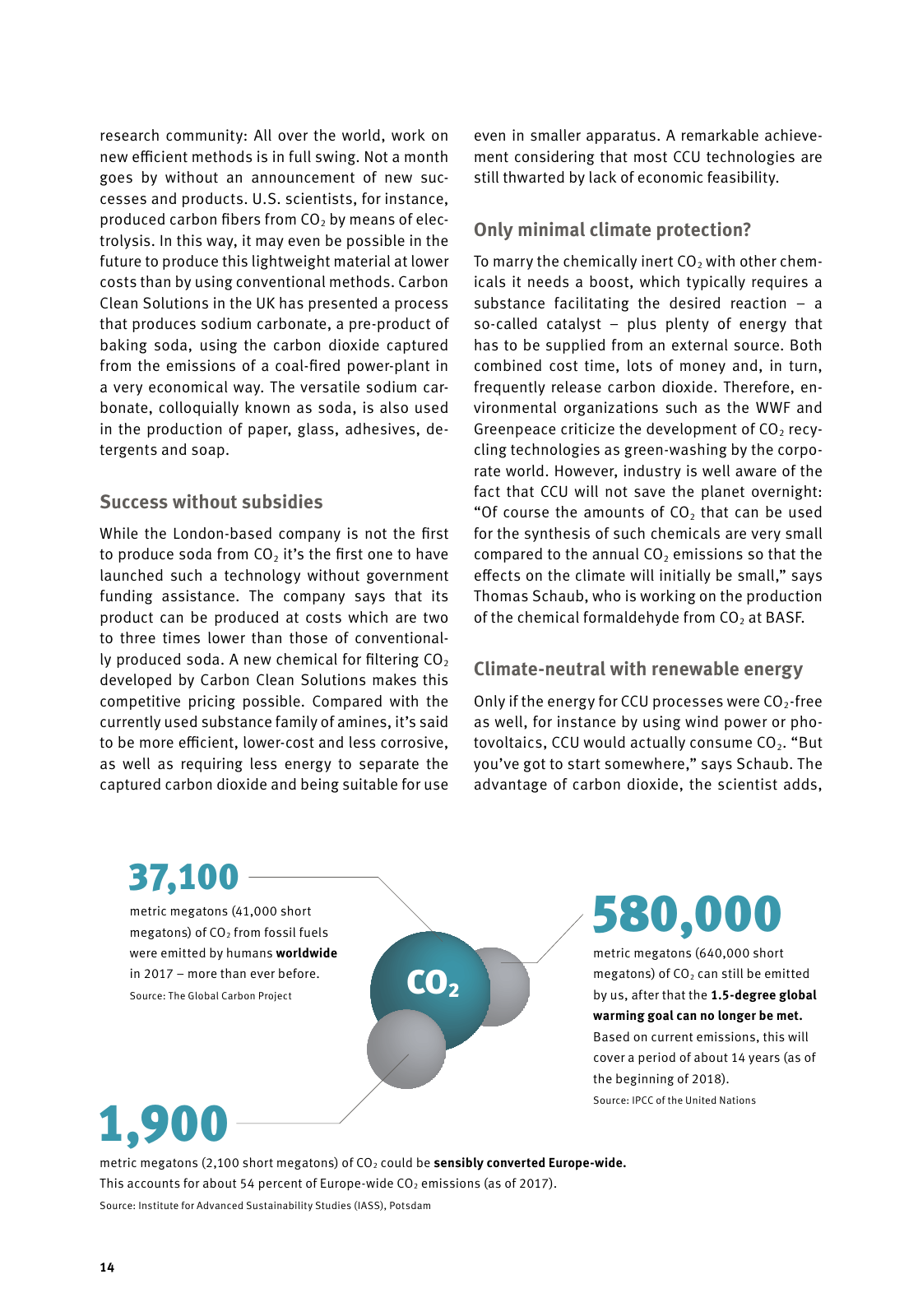CO2 research community All over the world work on new efficient methods is in full swing Not a month goes by without an announcement of new suc cesses and products U S scientists for instance produced carbon fibers from CO2 by means of elec trolysis In this way it may even be possible in the future to produce this lightweight material at lower costs than by using conventional methods Carbon Clean Solutions in the UK has presented a process that produces sodium carbonate a pre product of baking soda using the carbon dioxide captured from the emissions of a coal fired power plant in a very economical way The versatile sodium car bonate colloquially known as soda is also used in the production of paper glass adhesives de tergents and soap Success without subsidies While the London based company is not the first to produce soda from CO2 it s the first one to have launched such a technology without government funding assistance The company says that its product can be produced at costs which are two to three times lower than those of conventional ly produced soda A new chemical for filtering CO2 developed by Carbon Clean Solutions makes this competitive pricing possible Compared with the currently used substance family of amines it s said to be more efficient lower cost and less corrosive as well as requiring less energy to separate the captured carbon dioxide and being suitable for use even in smaller apparatus A remarkable achieve ment considering that most CCU technologies are still thwarted by lack of economic feasibility Only minimal climate protection To marry the chemically inert CO2 with other chem icals it needs a boost which typically requires a substance facilitating the desired reaction a so called catalyst plus plenty of energy that has to be supplied from an external source Both combined cost time lots of money and in turn frequently release carbon dioxide Therefore en vironmental organizations such as the WWF and Greenpeace criticize the development of CO2 recy cling technologies as green washing by the corpo rate world However industry is well aware of the fact that CCU will not save the planet overnight Of course the amounts of CO2 that can be used for the synthesis of such chemicals are very small compared to the annual CO2 emissions so that the effects on the climate will initially be small says Thomas Schaub who is working on the production of the chemical formaldehyde from CO2 at BASF Climate neutral with renewable energy Only if the energy for CCU processes were CO2 free as well for instance by using wind power or pho tovoltaics CCU would actually consume CO2 But you ve got to start somewhere says Schaub The advantage of carbon dioxide the scientist adds metric megatons 41 000 short megatons of CO2 from fossil fuels were emitted by humans worldwide in 2017 more than ever before metric megatons 2 100 short megatons of CO2 could be sensibly converted Europe wide This accounts for about 54 percent of Europe wide CO2 emissions as of 2017 37 100 1 900 Source The Global Carbon Project Source Institute for Advanced Sustainability Studies IASS Potsdam metric megatons 640 000 short megatons of CO2 can still be emitted by us after that the 1 5 degree global warming goal can no longer be met Based on current emissions this will cover a period of about 14 years as of the beginning of 2018 58 0 000 Source IPCC of the United Nations 14

Hinweis: Dies ist eine maschinenlesbare No-Flash Ansicht.
Klicken Sie hier um zur Online-Version zu gelangen.
Klicken Sie hier um zur Online-Version zu gelangen.